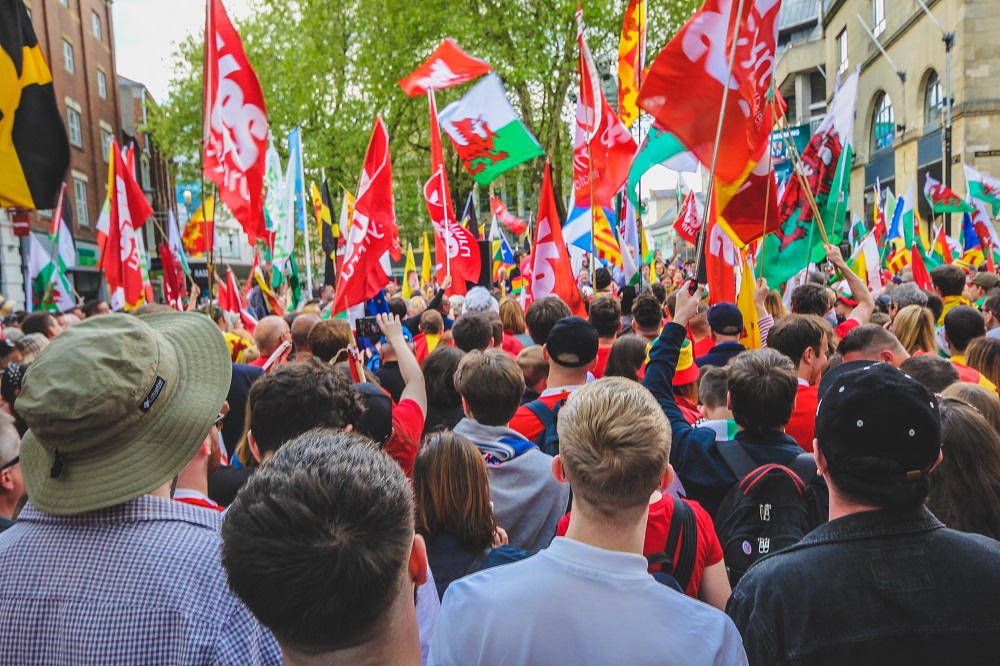Theo Davies-Lewis looks at the first Senedd debate on the right to hold an independence referendum.
Historians of Welsh history have mulled over questions of identity, culture and nationhood for decades.
Who Speaks for Wales?, Raymond Williams famously asked in 1971. Gwyn Alf Williams, meanwhile, preferred to see Wales as an artifact re-produced on a daily basis by the people (but only “if they want to”).
More recently, Martin Johnes controversially probed whether we are an English colony after all. But for all the books and research into Welsh history, Welsh nationhood is still complex to define and explain.
Identity is a multi-faceted and evolving experience – tied-up with factors such as language, history, geography, politics, ethnicity and social class. It’s the case in Wales and elsewhere across the globe; but recent events including Scotland’s independence referendum, Brexit and the current coronavirus crisis have sparked a particular re-think of the modern British state and what its purpose and benefits are for its four nations.
It was particularly fitting that the diverse ideas specifically about Wales – and what it should represent in the twenty first century – were a cornerstone of yesterday’s highly-charged independence debate in the Senedd. Indeed, as Adam Price articulated, it was an historic motion tabled by Plaid Cymru, which, although significantly defeated by members across the Senedd, embodied how ideas about Welsh self-government have come to the forefront of people’s minds during recent months.
But the content of the debate was even more telling than its initial proposals. Every corner of the Senedd was divided on the future of Welsh democracy, reflected in the various amendments tabled by members across the political spectrum. They included reaffirming the strength of Wales’ devolved government; arguing for our reliance on the UK treasury and political ties of the Union; the question of a separate Welsh bill of rights and constitution; and even the possibility of abolishing the Senedd altogether.
Dai Smith has spoken of the plurality of Welsh experience, and our elected representatives’ views on our democracy captures that. It is not the case in every Senedd sitting that we have members lining up and broadcasting their views on the democratic place of Wales in twenty-first century Britain.
That should be welcomed. And as expected, our parliament reflected the general consensus across the country in that regard: Welsh political autonomy within the UK, at least for now.
What was most striking in the range of contributions – discarding Gareth Bennett’s cries that if Wales were to be an independent nation, nobody could answer its “begging bowl” – is that the main parties, both Conservative and Labour, were happy enough to line up to tell Wales that it could never be an independent nation. It is too poor and dependant on the UK, the arguments went, and the Conservatives even went as far to say “we punch about our weight” in the UK. Cymru am Byth.
It is hard to think of a parliament whose members would happily belittle their country so ferociously, while others in the debate spoke of the polar opposite: a vague vision of Welsh sovereignty yet to be defined, but one that will lead to us a glorious new chapter in our history.
Innovative. Informed. Independent.
Your support can help us make Wales better.
There are also members who happily manage the duality of being Welsh and British, some more devoted to the latter, and others who probably do not feel Welsh at all. In that respect, our parliament may also reflect the state of mind of our people up-and-down-the country – which is itself the product of history and more recent political upheaval.
Above all, then, yesterday’s debate was far bigger than Welsh independence itself, if that is itself possible. It showed the Welsh people that our parliamentarians are by no means agreed on what modern Wales is and what it should be.
It is extremely difficult to separate politics and culture in many societies, including ours, and provides a glimpse into not how united we will be over the next decade, but how divided modern Wales might become.
It is evident there is no agreement across our parliament – and throughout the country – over the future direction of Wales. It is, however, undeniably that there is a feeling that the idea of modern Wales is undergoing rapid change, with significant political implications for us and the rest of the UK.
So, although Gwyn Alf plunged through history to ask When Was Wales?, it may be that the answer is not in our past but rather at some point in the not too distant future.
All articles published on the welsh agenda are subject to IWA’s disclaimer.





